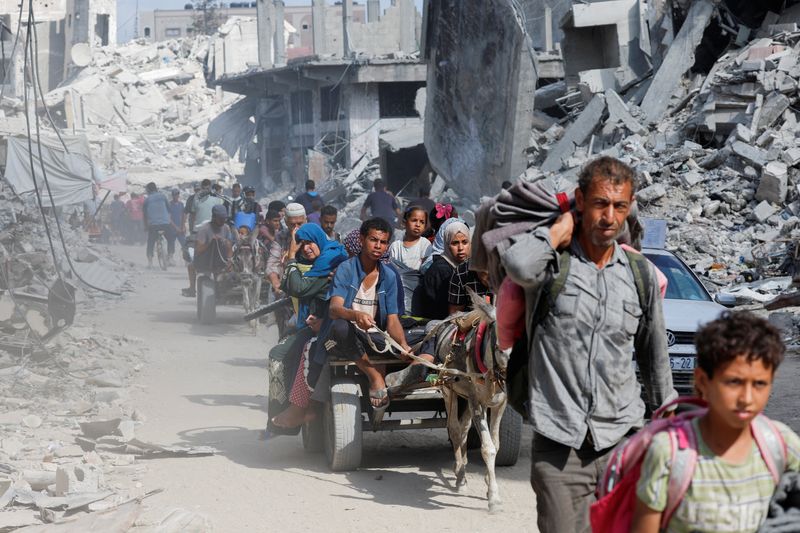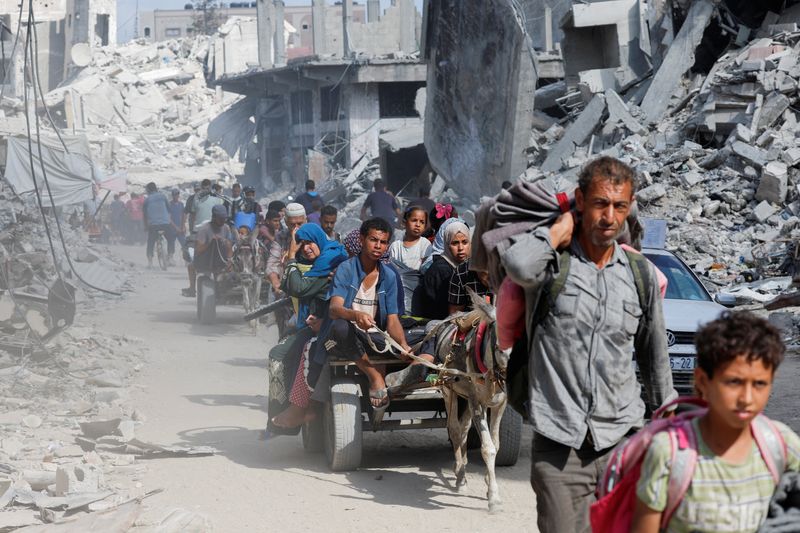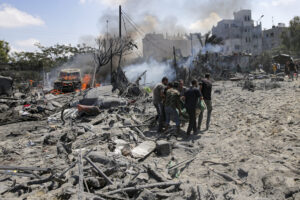New mass exodus hits central Gaza as Hamas says Israel stalls on ceasefire

By Nidal al-Mughrabi and Ramadan Abed
CAIRO/DEIR AL-BALAH, Gaza Strip (Reuters) -Thousands of Palestinians fled a community in the central Gaza Strip on Monday in the face of new Israeli evacuation orders, worsening the humanitarian plight in an area already inundated with displaced people fleeing an assault in the south.
Islamist group Hamas accused Israel of blocking a ceasefire, saying Prime Minister Benjamin Netanyahu’s government had inserted new conditions into a longstanding truce proposal at the lastest talks, conducted through international mediators.
Israeli forces, which have now captured nearly the entire Gaza Strip in nearly 10 months of war, have spent the last several weeks launching major operations in areas where they had previously claimed to have uprooted Hamas fighters.
Hundreds of thousands of people have converged on Deir al-Balah, a small city in the centre of the enclave that is the only major area yet to be stormed, many forced there by fighting in the ruins of Khan Younis further south since last week.
In its latest assault, Israel ordered residents on Sunday to flee Al-Bureij, just northeast of Deir.
“What is left? Deir? Deir is full of people. Everyone is in Deir. All of Gaza. Where should people go?” Aya Mansour told Reuters in Deir after fleeing from Bureij.
The Israeli military said fighter jets hit 35 targets across the Gaza Strip over the past day as troops battled fighters in Khan Younis and Rafah, close to the border with Egypt. The armed wings of Hamas and the Islamic Jihad said fierce gun battles have been ongoing in those two areas as well as in the suburb of Tel Al-Hawa in Gaza City further north.
Palestinian medical officials said at least eight people were killed in an Israeli air strike earlier in Khan Younis.
In the latest sign of a worsening public health emergency, the Gaza Health Ministry declared a polio epidemic, following the detection of the virus in sewage samples.
On Sunday, the military issued new evacuation orders to some districts in Bureij, forcing thousands to leave before the army blew up several houses.
Some families used donkey carts and rickshaws to carry whatever belongings remained. Many walked for several km on foot to reach Deir or al-Zawayda town to the west.
Philippe Lazzarini, head of UNRWA, the United Nations relief agency for Palestinians, said only 14% of the Gaza Strip had not been placed under evacuation orders by the Israeli military. People have been forced to evacuate repeatedly, often with only a few hours notice.
CEASEFIRE TALKS
Although Prime Minister Benjamin Netanyahu has faced weekly demonstrations from Israelis demanding a ceasefire to bring back more than 100 hostages still held in Gaza, there has been little visible progress in talks brokered by Qatar and Egypt.
Negotiations are set to continue after Israeli officials returned from the latest round in Rome on Sunday. Washington, which sponsors the talks, has repeatedly said a deal is close; the latest talks are over a proposal President Joe Biden unveiled back in May.
But Hamas said the latest Israeli response included new conditions.
“It is clear from what the mediators conveyed that Netanyahu has returned to his strategy of procrastination, evasion, and avoiding reaching an agreement by setting new conditions and demands,” Hamas said in a statement on Monday.
Aya Mohammad, 30, a Gaza City resident sheltering in Deir, said Gazans were losing hope in a truce: “It is all lies. I think I will die here. No one knows who is going to die first here.”
The Gaza Health Ministry said the detection of polio, long since eradicated in the enclave, “poses a health threat to the people of Gaza, to neighboring countries, and a setback to global efforts to end polio.”
According to the World Health Organization, polio is endemic only in Pakistan and Afghanistan, but 35 countries are still listed as subject to outbreaks, including Gaza’s neighbour Egypt, and any country risks the return of the disease if an outbreak goes unchecked. Israel said last week it was offering polio vaccines to troops deployed in Gaza.
The limited access to water has worsened health complications from poor sanitation. Many displaced people were suffering from skin diseases, and children are afflicted by fevers, continuous weeping, and declining to eat or be breastfed, said Hussam Abu Safiyah, the director of the Kamal Adwan Hospital in northern Gaza.
The war began with an assault on southern Israel by Hamas-led fighters who killed 1,200 people and captured around 250 hostages, according to Israeli tallies.

Since then Israeli forces have killed more than 39,000 Palestinians in the Gaza Strip, according to health authorities there who do not distinguish between combatants and civilians but say more than half of the dead are women or children. Israel, which has lost around 330 soldiers in Gaza, says a third of those it has killed are fighters.
Hamas has demanded a path to an end to the war in Gaza as a condition for its agreement to a ceasefire. Israeli Prime Minister Benjamin Netanyahu has said repeatedly the conflict will stop only once Hamas is defeated.
(Reporting and writing by Nidal al-Mughrabi in CairoAdditional reporting by Ali Sawafta in Ramallah and Ramadan Abed in GazaEditing by Peter Graff)





